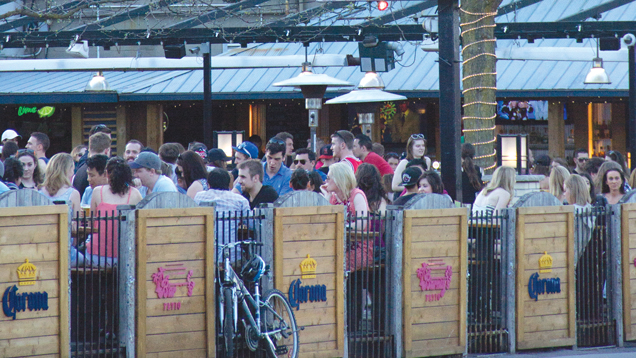Practice safe partying on Halloween
 CREDIT: CANDIS BROSS
CREDIT: CANDIS BROSSThere are mainly two options for Halloween fun and one could be safer than the other.
For students attending Western University and Fanshawe College, Halloween is a time to dress up in costumes, have some drinks and dance to music. The location for these celebrations can be house parties or going out to a club. Both choices affect the type of party that will take place.
Control is a major difference between the two options. Clubs and bars charge a cover fee and allow a specific amount of people into the establishment in order to adhere to the fire code protocol for the building. House parties are often free and aim to fit a large, often unquantifiable amount of people, which is a fire code risk.
Clubs and bars are only allowed to permit those who are of the legal drinking limit and older to enter. House parties often do not require identification to confirm that guests are of the legal drinking age, which can promote illegal consumption of alcohol.
There are many other offences that can be committed outside of clubs and bars. Sergeant David Ellyatt of the London Police Service says that police have to be on alert.
“By keeping yourself in control [we] avoid all things such as intoxication in public places as well as drinking and driving,” Sgt. Ellyatt said. “Statistically speaking, we can see that when youths are drinking, other things such as sexual assaults will occur, [also] fights, brawls and disruptive behaviour.”
For Melissa Knowler, public health nurse with the Middlesex- London Health Unit, students need to realize the impact alcohol has on control.
“When you are drinking at a house party, your inhibitions are down. There is no one supervising your drink. Hopefully your friends are, but generally everyone is just drinking and topping up their drinks,” Knowler said. “[Psychologically], alcohol can make people violent and sometimes affect sexual consent and push people to go further than they want to.”
Alcohol is a big part of the party experience among students. Knowler encourages students to educate themselves on the serious consequences that come with consuming the drug.
“Long-term effects associated with alcohol can be cancer, mental health issues such as depression and social [anxiety]. You can get breast cancer, throat and neck cancer and colorectal cancer,” she said. “Even in short-term situations students can get alcohol poisoning, which is a serious threat and can kill you.”
The act of doing drugs at a party can seep into a student’s year at Western or Fanshawe. Knowler has observed the effect that substances can have on performance in school.
“That addiction can continue and spiral out of control. [This] is what we are concerned about,” she said. “[The] addiction becomes part of your life. You have to keep needing that upper to get to that same level.”
Responsibility in these situations dramatically changes the safety of the situation. With staff taking care of people in the club or bar, the establishment works to maintain a secure environment for guests.
“We just want to make sure everyone gets home safe and that no one ends up in the hospital,” Sgt. Ellyatt said. “We want everyone to have a safe evening.”
Students take a risk when attending a house party because this environment cannot be guaranteed. It is important to party safely; otherwise you will be in for more than a scare.














